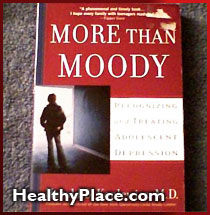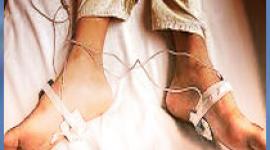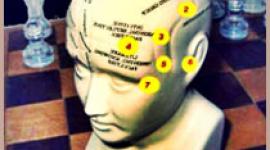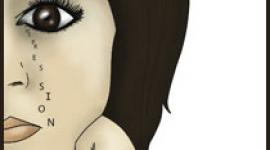Advice: 'It's Hard For Parents To Understand'
In a new book, Dr. Harold Koplewicz helps families sort out normal adolescent irritability from real illness
 As the founder and director of the New York University Child Study Center, Dr. Harold Koplewicz has seen firsthand the pain that depression brings to families. His new book, "More Than Moody: Recognizing and Treating Adolescent Depression," describes current therapeutic approaches and new research.
As the founder and director of the New York University Child Study Center, Dr. Harold Koplewicz has seen firsthand the pain that depression brings to families. His new book, "More Than Moody: Recognizing and Treating Adolescent Depression," describes current therapeutic approaches and new research.
How does depression manifest itself differently in teens and adults?
Depressed teenagers are more reactive to the environment than depressed adults. In addition, they act irritable. In classical depression, you are depressed all -or almost all- of the time. Depressed teens' moods are much more changeable. If an adult male gets depressed and you take him to a party, he is still depressed. In fact, he may depress others at the party. A teenage boy who is depressed and gets taken to a party might brighten, might actually want to have sex. If pursued, he might enjoy himself. But if he goes home alone, he is likely to become very depressed again. These mood changes are very hard for parents to understand.
Most teenagers are moody. When should parents start to worry?
Parents have to know their children. Adolescence is not a good time to introduce yourself. Money should have been put in the bank earlier. Then, during adolescence, it's a continuation of a close relationship. You understand what your child's sleep habits are like, what his energy level is like, what her concentration is like, so you can observe when changes in usual behavior last for a month. Then I would get an evaluation.
What would you tell parents who feel guilty when their children are depressed?
Parents want their children to be happy so much that they feel somehow responsible if their child is not. I would emphasize that depression is a real illness. Depression [is] such a misused term. We're not talking about demoralization, or about being dispirited. We're talking about a real illness that has neurobiological underpinnings and that parents have to take as seriously as diabetes.
Where should parents go for help? Do you think there are enough resources?
There are so many barriers to getting a teenager help. In our nation, it's nothing less than a tragedy that only one out of five teenagers who suffer from depression gets any help. It's even worse if you are a kid from a lower socioeconomic group. The first thing to do would be to go to your pediatrician or your school psychologist who can refer you to a child psychiatrist or a child psychologist. Diagnosis is the most important issue here. I would explore the Web site of the American Academy of Child and Adolescent Psychiatry and get the name of a board-certified child psychiatrist. I would go to a university-affiliated medical center. I would call the local medical school. I would go to the American Psychological Association and ask for a child psychologist. After the diagnosis, I would ask for a depression treatment plan, keeping in mind that more than one approach can work. There is talk therapy, specifically cognitive behavioral therapy and interpersonal therapy, which requires specialized training and has been shown to be effective. Depression medications can also work.
Are the medications normally prescribed safe for developing brains?
We've been using these drugs for many years, but there is still a question out there. I think the benefits outweigh the risks. The jury is still out, but some animal studies have even shown that taking the medication may actually prevent future episodes of depression, but this is all preliminary. Parents also need to be informed about the risk of not taking medicine. We're starting to learn that with each successive episode, patients are more at risk for another depressive episode. Each episode may affect brain development negatively. Therefore, the benefits of taking medication outweigh the risks. There are real costs to the illness which should affect how we think about the risks of treatment.
What's the biggest myth about teens and depression?
I think we still have trouble believing that children and teenagers can get depressed. Twenty years ago, the prevailing theory was that depression in teens, like moodiness, was normal and that teenagers who weren't depressed were abnormal. Now we know that's not accurate. Another myth: depression is reserved for the poor. It turns out to be an equal-opportunity disorder.
This article appeared in the Oct. 7, 2002 issue of Newsweek
next: Pediatric ECT Electroconvulsive Therapy in Adolescents and Children
~ depression library articles
~ all articles on depression
APA Reference
Tracy, N.
(2009, January 12). Advice: 'It's Hard For Parents To Understand', HealthyPlace. Retrieved
on 2026, March 5 from https://www.healthyplace.com/depression/articles/advice-its-hard-for-parents-to-understand



